Latest Report Says Iran's Annual Inflation Hovers Above 40 Percent
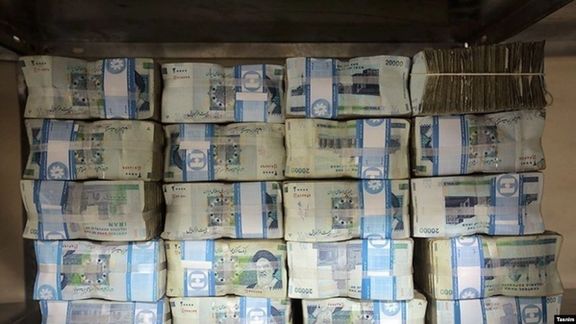
Iran’s annual inflation rate hovered above 40 percent in the last Iranian calendar month that ended on January 20, a statistical center reported on Saturday.

Iran’s annual inflation rate hovered above 40 percent in the last Iranian calendar month that ended on January 20, a statistical center reported on Saturday.
January 20, the government’s statistical center reported on Saturday.
The annual inflation rate stood at 42.4 percent during December 21-Jaunuary 20. The annual rate is calculated based on a basket of prices for the year ending in each month compared to the previous 12 months.
The point-to-point inflation rate, which compares prices in a particular month to the same period in the previous year, stood at 36.9 percent, the Statistical Center of Iran said.
The report says prices for food and rents had the highest jump last month. Previous reports has indicted that food prices were growing with an annual rate of above 60 percent.
Iran’s currency has fallen eightfold since early 2018, due to US sanctions and inflation has skyrocketed. Millions of working Iranian are now categorized as poor, with the middle class shrinking. A member of parliament’s budget committee recently announced that 20 million people are suffering from absolute poverty.
Teachers, industrial and healthcare workers have been protesting regularly demanding higher wages to keep pace with inflation. A typical worker earns between $120-150 a month, which in large cities is barely enough for rent. The government, faced with a large budget deficit is phasing out food subsidies in coming months.
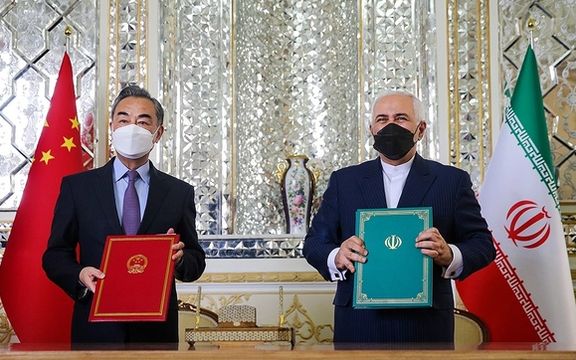
Several clerics and politicians in Iran have criticized the aura of secrecy surrounding Tehran's long-term deals with Russia and China as colonial in nature.
As criticism of President Ebrahim Raisi's recent visit to Russia continues, critics say that Iran has become a "Colony for China and Russia.” Hardliner daily Kayhan, affiliated with the office of Supreme Leader Ali Khamenei has accused the critics of "Affiliation with the United States."
On Saturday, January 22, Ayatollah Seyyed Hossein Mousavi Tabrizi, Iran's first ever Judiciary Chief, said an interview with reformist daily Arman that "Russia is not trustworthy. The Islamic Republic has been forced to signing long-term agreements with China and Russia because of international isolation."
Mousavi Tabrizi reiterated that because of its enmity with other countries Tehran has been forced to enter into deals with the two countries, adding that if it gives up its hostile approach, then it will not need such contracts. Meanwhile, he called on the government to publish the text of these agreements.
In another development, responding to questions about why Iranians have been kept in the dark, a clerical member of the presidium of the Iranian parliament (Majles), Alireza Salimi and another prominent lawmaker Mojtaba Zolnouri said that the Iranian government is not interested in disclosing the details of these deals.
In the meantime, Former President Mahmoud Ahmadinejad said in an interview with a Turkish TV network that secret agreements do not serve the nation's interest, adding that these deals will not be valid if they are not put to vote in the Iranian parliament.
In yet another example of opposition to secret deals, Mohammad Zare-Foumani, a young cleric who is the managing editor of proreform newspaper Sedaye Eslahat (Voice of Reforms), said at a gathering of Iranian political parties on Thursday: "Iran has become a colony of China and Russia, the two countries that have destroyed Iran's economy." Founmani also called for the publication of the full text of the long-term contracts with China and Russia.
The document with China was signed last March by the foreign ministers of Iran and China but its contents remain confidential. Ali Rabiei, the spokesman for the Rouhani administration had said in late March 2021 that the Iranian government has no problem with disclosing the details of its contracts, "but the Chines have a different view about this."
On Friday, Yaqub Rezazadeh, a member of the Iranian parliament's National Security and Foreign Policy Committee said that the reason for keeping the deals secret is that Iran does not want Western countries to find out about the details and use them to obstruct Iran's progress.
The Kayhan newspaper has said that the critics are individuals who dream about a secular pro-Western government in Iran, adding that the United States is counting on these individuals.
Last week, during a visit to China, Foreign Minister Hossein Amir-Abdollahian said that the implementation of the 25-year contract with China has started. China acknowledged this one day later.
IRGC-linked news agency IRGC-affiliated Tasnim harshly criticized Amir-Abdollahian's statement about Iran's decision to have balanced ties with East and West and ruled out anything other than reliance on China and Russia. On Friday, some prayer Imams, particularly in Isfahan and Rasht, praised Russia and China in such an exaggerated way that according to Asr Iran website, "even China and Russia have never claimed to be that good!"
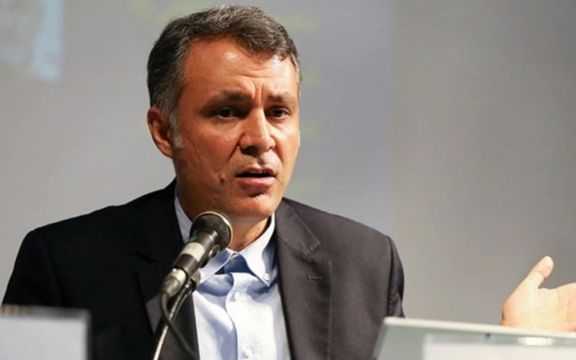
Dismissal of two professors from two of Iran’s top universities has created controversy, evoking memories of purging independent-minded academics in the past.
Mohammad Fazeli, a professor of sociology at Beheshti University, and Arash Abazari, a philosophy professor at Sharif University, were dismissed in the last few days.
Abazari is well-known for his book Hegel's Ontology of Power: The Structure of Social Domination in Capitalism, which was published by Cambridge University Press. Fazeli’s works focus on sociology of politics and science, especially in the energy sector.
The Islamic Republic has conducted several ‘cleansing’ operations in universities, firing professors that it has deemed not committed to the regime.
The most widespread firings took place right after the 1979 revolution and was peaked again during the presidency of Mahmoud Ahmadinejad, who forced many professors into retirement.
Kaave Lajevardi, a fellow philosopher and translator, called it a disgrace for Iran’s education system, saying that Abazari is not tolerated while many are busy Islamizing the universities.
Abdonnaser Hemmati, the former head of Iran’s central bank who run for president last June, has protested to Fazeli’s firing and called on President Ebrahim Raisi to intervene.
Renowned reformist Abbas Abdi described such dismissals as part of a larger process to destroy the institution of science in Iran.
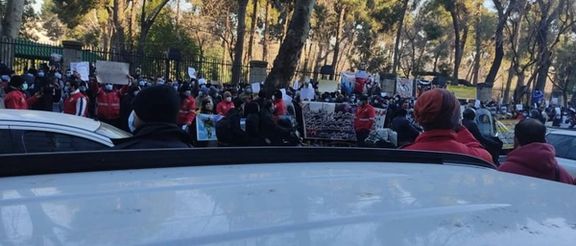
The spokesman for Iran's police says salaries of police officers have increased several times in the current Iranian year, describing their living conditions as a major concern.
In an interview with ILNA on Saturday, Brigadier General Mehdi Hajian said several measures have been taken to improve the living conditions of law enforcement personnel.
“One of the main concerns of the general command is the livelihood of its staff and personnel”, he said, noting that negotiations are underway to provide further funding for the forces.
The news about several raises for security personnel comes as teachers, nurses, industrial workers and others have been protesting for higher salaries amid high inflation, but the government says it cannot afford to pay substantially higher salaries.
Food prices have risen by more than 60 percent in recent months, on top of high inflation in the previous three years. Government figures show that prices for 83 percent of basic food staples have reached a critical level. People living on salaries have cut back on nutritious food, such as meat, fruits and dairy products.
Earlier in the week, hundreds of firefighters held a demonstrationin Tehran to protest their poor living conditions, and last week hundreds of staff members from Iran’s judiciary department took to the streets in several cities while teachers and pensioners have held several rounds of nationwide protests.
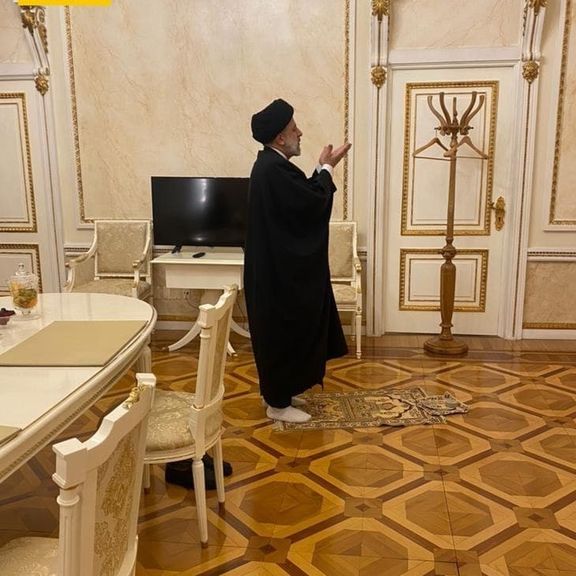
Supreme Leader Ali Khamenei's representative in Alborz province says President Ebrahim Raisi will offer Islamic prayers at the White House someday.
Mohammad-Mehdi Hosseini-Hamedani, a cleric, said in his Friday Prayer that Raisi’s prayers at Kremlin conveyed a very important message.
A photo of Raisi praying at the Kremlin during his meeting with Russian President Vladimir Putin has been advertised by many officials and followers of the Iranian president, including his wife that described it as a revelation of spirituality.
The photo has been used extensively in what appears to be a publicity campaign for Raisi amid public criticism of his government's efforts to expand relations with Russia and China. Among Iranians the names of both countries are associated with communism and atheism.
During their Friday Prayer sermons, representatives of Khamenei all over the country praised the image, calling it an important event.
Mohammad Ali Nekounam, the Friday Prayer leader of Shahrekord, described Raisi’s prayers at Kremlin as a “conquest” and the Friday Imam of Esfahan said it showed that “We only rely on God”.
The contents of Friday Prayer sermons delivered by Khamenei's local representative in various cities are dictated by two state bodies close to Khamenei's office, officially known as "The Policy-making Council for Friday Prayer Imams" and the "Friday Prayer Headquarters," both dominated by hardliner clerics.
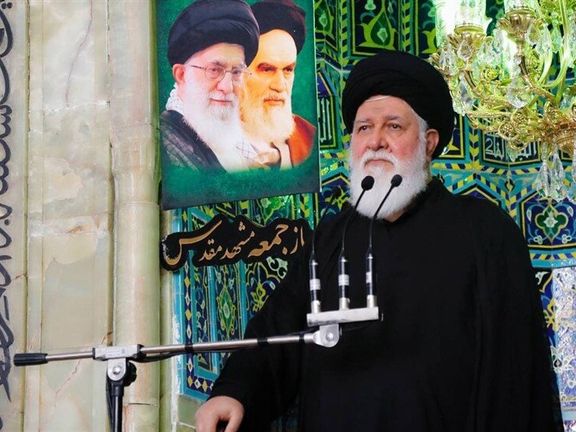
Iranian hardliner cleric Ahmad Alamolhoda says women with loose-fitting hijab should not feel secure in public, urging people to express hatred towards them.
During his Friday Prayer sermon, Alamolhoda – Ali Khamenei’s representative in Mashhad and father-in-law of Iran's President Ebrahim Raisi – said that women with loose hijab should feel the hatred, stressing that “expressing hatred and disgust for a woman without hijab is a divine duty”.
“People should solve the problem, not the police”, he said. His remark could be seen as a green light for religious zealots to confront women in the streets and cause harm.
Similar calls for crackdown on those who fail to comply with compulsory hijab by other hardliners sparked a series of acid attacks on women in Esfahan in 2014.
He also talked about an official ban on women not to enter soccer stadiums, saying, “Stadiums are a place of excitement”, stating that women should not be excited in the presence of men.
His comments came less than a month after hundreds of Iranian social media users protested to compulsory hijab and the ideology the government is imposing on them, trending the hashtag #LetUsTalk.
A report by the parliament's research center in 2018 said the number of Iranians who believed in mandatory hijab had waned. According to the report those who considered the hijab a value that could be stipulated in law had fallen from 85 percent in the early 1980s to around 35 percent.